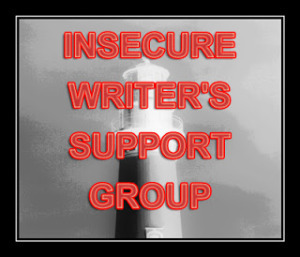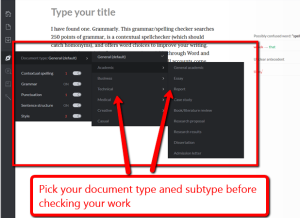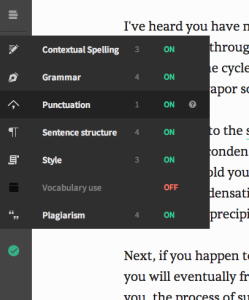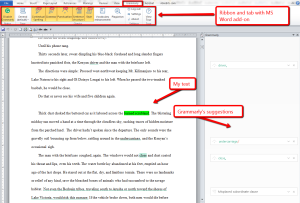Jacqui Murray's Blog, page 138
March 23, 2015
37 Ways to Describe Depression
 Here’s my list of what non-clinical depression looks like. Think of these as indicative of sadness.
Here’s my list of what non-clinical depression looks like. Think of these as indicative of sadness.
A note: These are for inspiration only. They can’t be copied because they’ve been pulled directly from an author’s copyrighted manuscript (intellectual property is immediately copyrighted when published).
Depressed
Her high cheekbones were sunken. Her eyes were dark circles staring out with bewilderment and fear, the bright blue color terrifyingly dim
A heaviness, a cloud of depression and weariness, seemed to draw all of Ashton���s features downward
He could see the weight in her walk
Like an emotional sticky tray
Like an emotional Venus fly trap
I felt weightless and anonymous
Youth left waiving from the platform as the train pulled out
His voice had the pallid, toneless quality of his skin.
A sullen barista
Depression

Recent Loss – through death, divorce, separation, broken relationship, loss of job, money, status, self-confidence, self-esteem, loss of religious faith, loss of interest in friends, sex, hobbies, activities previously enjoyed
forehead is wrinkled in the middle, but not across the whole breadth, as when the eyebrows are raised in surprise.
Change in Personality – sad, withdrawn, irritable, anxious, tired, apathetic Change in Sleep Patterns – insomnia, often with early waking or oversleeping, nightmares Change in Eating Habits – loss of appetite and weight, or overeating
Fear of losing control- harming self or others
Low self esteem- feeling worthless, shame, overwhelming guilt, self-hatred, “everyone would be better off without me” No hope for the future – believing things will never get better; that nothing will ever change
Other things to watch for- Suicidal impulses, statements, plans; giving away favorite things; previous suicide attempts
More descriptors for writing:
48 Collections to Infuse Your��Writing
Jacqui Murray is the author of the popular Building a Midshipman , the story of her daughter���s journey from high school to United States Naval Academy. She is the author/editor of dozens of books on integrating tech into education, webmaster for six blogs, an Amazon Vine Voice book reviewer, a columnist for Examiner.com and TeachHUB, Editorial Review Board member for Journal for Computing Teachers, monthly contributor to Today���s Author and a freelance journalist on tech ed topics. You can find her book at her publisher���s website, Structured Learning.��
, the story of her daughter���s journey from high school to United States Naval Academy. She is the author/editor of dozens of books on integrating tech into education, webmaster for six blogs, an Amazon Vine Voice book reviewer, a columnist for Examiner.com and TeachHUB, Editorial Review Board member for Journal for Computing Teachers, monthly contributor to Today���s Author and a freelance journalist on tech ed topics. You can find her book at her publisher���s website, Structured Learning.��
Filed under: descriptors

March 20, 2015
Book Review: The Flamekeepers
 The Flamekeepers
The FlamekeepersMy rating: 4 of 5 stars
The Flamekeepers (Thomas & Mercer 2015) is the story of a doomsday cult that might be headed into dangerous territory. Alecia Motley, a member, warns the FBI and they call on former SEAL Lukasz Gardocki to infiltrate the group and see what the real goals are. Lukasz agrees because he carries ongoing guilt that he couldn’t save the life of Alecia’s brother who was a former SEAL. What he finds when he gets there is a mixture of well-intentioned, hard-working people and a devious leadership group that is too secretive for Lukasz’s instincts to trust. When he finds out their real purpose, he wonders if he will escape with his life saving Alecia.
Flamekeepers is written by J. Gregory Smith, former Amazon Breakthrough Novel Award quarter finalist (ABNA is no longer a contest) and author of the Paul Chang Mysteries series. Smith is an excellent storyteller with interesting characters. What they lack in complexity, he makes up for in their true voices and honest interactions with each other. It didn’t take long before I was rooting for Lukasz and Alecia and a host of other supporting actors, hoping they would come out of this thriller in one piece.
Where Smith had trouble was in his plotting. Though well-paced with lots of action, as it approached the climax, several spots were unbelievable. The reasons Smith gave for the characters’ actions didn’t make sense which left me wondering what was really going on. Luckily there were just a few of these (though at critical moments), and Smith recovered with an excellent surprise ending.
Overall, a good read from an up-and-coming new author. I look forward to watching his career develop.
If you would like to purchase this book from Amazon, click the link below:
The Flamekeepers

More thriller book reviews:
Book Review: Gray��Retribution
Jacqui Murray is the author of the popular Building a Midshipman , the story of her daughter���s journey from high school to United States Naval Academy. She is the author/editor of dozens of books on integrating tech into education, webmaster for six blogs, an Amazon Vine Voice book reviewer, a columnist for Examiner.com and TeachHUB, Editorial Review Board member for Journal for Computing Teachers, monthly contributor to Today���s Author and a freelance journalist on tech ed topics. You can find her book at her publisher���s website, Structured Learning.��
, the story of her daughter���s journey from high school to United States Naval Academy. She is the author/editor of dozens of books on integrating tech into education, webmaster for six blogs, an Amazon Vine Voice book reviewer, a columnist for Examiner.com and TeachHUB, Editorial Review Board member for Journal for Computing Teachers, monthly contributor to Today���s Author and a freelance journalist on tech ed topics. You can find her book at her publisher���s website, Structured Learning.��
Filed under: Amazon, book reviews Tagged: thriller

March 18, 2015
How I’m Doing on ‘To Hunt a Sub’
I am eager to get my book, To Hunt a Sub, completed, but I have to push it back a few months. I need to verify a few details (meaning, about fifty) with a specialist and they aren’t available until May.
Hopefully, then, I’ll sprint for the end.
Sigh.
Jacqui Murray is the author of the popular Building a Midshipman , the story of her daughter���s journey from high school to United States Naval Academy. She is the author/editor of dozens of books on integrating tech into education, webmaster for six blogs, an Amazon Vine Voice book reviewer, a columnist for Examiner.com and TeachHUB, Editorial Review Board member for Journal for Computing Teachers, monthly contributor to Today���s Author and a freelance journalist on tech ed topics. You can find her book at her publisher���s website, Structured Learning.��
, the story of her daughter���s journey from high school to United States Naval Academy. She is the author/editor of dozens of books on integrating tech into education, webmaster for six blogs, an Amazon Vine Voice book reviewer, a columnist for Examiner.com and TeachHUB, Editorial Review Board member for Journal for Computing Teachers, monthly contributor to Today���s Author and a freelance journalist on tech ed topics. You can find her book at her publisher���s website, Structured Learning.��
Filed under: blogs Tagged: to hunt a sub

March 16, 2015
Can You Fix These Grammar Problems?
 A dear efriend–Ankur Mithal over at Dark Office Humour–posted a list of funny signs found around the area. I got a good laugh over them and then my muse pointed out they were a great opportunity for grammar lessons.
A dear efriend–Ankur Mithal over at Dark Office Humour–posted a list of funny signs found around the area. I got a good laugh over them and then my muse pointed out they were a great opportunity for grammar lessons.
After all, we are grammaraticians, neologists, and writing experts. Who better than us to fix these signs in need of a comma, word rearrangement, or toss in the trash.
Read the list below and add a comment about how you would correct the errant grammar that led to the misunderstood message:
In an office:
TOILET OUT OF ORDER������. PLEASE USE FLOOR BELOW
In a Laundromat:
AUTOMATIC WASHING MACHINES: PLEASE REMOVE ALL YOUR CLOTHES WHEN THE LIGHT GOES OUT
In a London department store:
BARGAIN BASEMENT UPSTAIRS
In an office:
WOULD THE PERSON WHO TOOK THE STEP LADDER YESTERDAY PLEASE BRING IT BACK OR FURTHER STEPS WILL BE TAKEN
In an office:
AFTER TEA BREAK STAFF SHOULD EMPTY THE TEAPOT AND STAND UPSIDE DOWN ON THE DRAINING BOARD
Outside a second-hand shop:
WE EXCHANGE ANYTHING ��� BICYCLES, WASHING MACHINES, ETC. WHY NOT BRING YOUR WIFE ALONG AND GET A WONDERFUL BARGAIN?
Notice in health food shop window:
CLOSED DUE TO ILLNESS
Spotted in a safari park:
ELEPHANTS PLEASE STAY IN YOUR CAR
Seen during a conference:
FOR ANYONE WHO HAS CHILDREN AND DOESN���T KNOW IT, THERE IS A DAY CARE ON THE 1ST FLOOR
Notice in a farmer���s field:
THE FARMER ALLOWS WALKERS TO CROSS THE FIELD FOR FREE, BUT THE BULL CHARGES.
On a repair shop door:
WE CAN REPAIR ANYTHING. (PLEASE KNOCK HARD ON THE DOOR ��� THE BELL DOESN���T WORK).
How many could you fix?
More on grammar:
Writer���s Tip #29: No Exclamation Points!��Please!
Do You Make These Writing��Blunders?
Writer���s Tip #23: The Use of ���Lay���
Jacqui Murray is the author of the popular Building a Midshipman
 , the story of her daughter���s journey from high school to United States Naval Academy. She is the author/editor of dozens of books on integrating tech into education, webmaster for six blogs, an Amazon Vine Voice book reviewer, a columnist for Examiner.com and TeachHUB, Editorial Review Board member for Journal for Computing Teachers, monthly contributor to Today���s Author and a freelance journalist on tech ed topics. You can find her book at her publisher���s website, Structured Learning.��
, the story of her daughter���s journey from high school to United States Naval Academy. She is the author/editor of dozens of books on integrating tech into education, webmaster for six blogs, an Amazon Vine Voice book reviewer, a columnist for Examiner.com and TeachHUB, Editorial Review Board member for Journal for Computing Teachers, monthly contributor to Today���s Author and a freelance journalist on tech ed topics. You can find her book at her publisher���s website, Structured Learning.��
Filed under: grammar and spelling

March 13, 2015
Book Review: Badlands
by C.J. Box
My rating: 5 of 5 stars
I am a C.J. Box fan. I’ve read the entire Joe Pickett series (15 books) so when “Badlands” (Minotaur 2015) showed up on my Vine list, I grabbed it, hoping this might be the start of a new series. It is the story of criminal investigator, Cassie Dewell, who leaves a job in Montana for a new post in Grimstad North Dakota, center of the American oil boom. The town is undergoing massive cultural and social changes due to the skyrocketing oil business. Cassie immediately is caught up in what seems to be an open-and-shut auto accident that ends up mired in drugs, vicious Salvadoran hitmen, and corrupt police.
The story is fast-moving, fascinating to read, with lots of intriguing clues and well-developed characters. The setting is the wild badlands of the frigid American northern states, a perfect location for Box’s signature nature descriptions. It includes two distinct point-of-views, Cassie’s and the twelve-year-old boy who ends up unwillingly in the middle of his town’s drug sales.
Cassie Dewell is an interesting character. We are introduced to an overweight, atypical detective who is leaving a job where she wasn’t well-respected, maybe running from a past that could be viewed as good or bad. As she grows with her new job, we as reader develop respect for her ability to line up the clues and connect the dots. Like all good mystery storytellers, Box doesn’t always explain what’s going on, just throws the puzzle pieces out there for us to mull over.
My only problem with the book was it didn’t include Joe Pickett. Maybe a cameo, some time in the future, CJ? Could you make that happen?
Overall, a satisfying read that delivered on all of its promises.
If you’d like to purchase it from Amazon, you can use the link below:
Here’s CJ Box’s website, so you can read more about past and future books. Here’s a review from the Washington Post on one of his books–fascinating.
More reviews of mystery/thrillers:
Book Review: Crimes of��Memory
Jacqui Murray is the author of the popular Building a Midshipman , the story of her daughter���s journey from high school to United States Naval Academy. She is the author/editor of dozens of books on integrating tech into education, webmaster for six blogs, an Amazon Vine Voice book reviewer, a columnist for Examiner.com and TeachHUB, Editorial Review Board member for Journal for Computing Teachers, monthly contributor to Today���s Author and a freelance journalist on tech ed topics. You can find her book at her publisher���s website, Structured Learning.��
, the story of her daughter���s journey from high school to United States Naval Academy. She is the author/editor of dozens of books on integrating tech into education, webmaster for six blogs, an Amazon Vine Voice book reviewer, a columnist for Examiner.com and TeachHUB, Editorial Review Board member for Journal for Computing Teachers, monthly contributor to Today���s Author and a freelance journalist on tech ed topics. You can find her book at her publisher���s website, Structured Learning.��
Filed under: book reviews Tagged: detectives, murder mystery

March 11, 2015
65 Ways to Describe Sight and Eyes in Your Writing
Ever since William Shakespeare said:
“The Eyes are the window to your soul”
… people have been trying to decode ever glitter, wrinkle, squint, and gaze that passes from those orbs. When I read a description that catches my attention, I copy it down, using it later to remind me there’s more to a character’s eyes than ‘she looked’ or ‘his blue eyes’.
Here’s my list of 65 (and growing):
A note: These are for inspiration only. They can’t be copied because they’ve been pulled directly from an author’s copyrighted manuscript (intellectual property is immediately copyrighted when published).
Sight
Eyed me as though his bullshit meter was ticking in the red zone.
He blinked as his eyes adjusted.
an alertness in the eyes, behind the glasses that sat crookedly on the nose
Cold gaze fixed on the anxious young man
Cast a skeptical eye
Sure, we know that, said Herrera, taking off his glasses to inspect the lenses.
Gaffan saw Marley���s eyes open wide in surprise and recognition.
Eyes bleary from surveillance and the two-hour drive
Vision narrowed to a pinprick
Eyes clouded
eyes locked on like magnets
four pairs of eyes blinked in unison
studied her with a predator’s unwavering attention
blinked a couple of times
Squinted out into the audience

eyes narrowed to slits
Narrowed his eyes
eyes locked in a shared understanding
yellow rimmed eyes narrowing
peer sightlessly at a wall
eyes turned inward
shook her head and stared at the pool
Staring sightlessly into the darkness
Stared off into the crowd but didn’t seem to see anything
Stared into the distance
Fixed expression
Looked at a place somewhere over his shoulder
focused on an empty space in the air between them
eyes narrowed, she got a vertical wrinkle between her eyebrows. Her lips pursed slightly.
Their eyes met, but he broke it off
meaningful eye contact
studied Hood with her level gaze
risked a peek
she screwed her eyes shut
stared brazenly into her eyes
opened her eyes wide
dark eyes radiated a fierce, uncompromising intelligence
rubbed raw eyes
eyes felt scratchy and I was jittery with coffee and raw from sleeplessness.
His eyes flickered past me.
His eyes were never still and he never looked at me except in passing
Caught her peeking at Hawk sideways out of a narrow corner of her right eye.
Watching the bystanders from the edge of his vision
Looked him over with the respect men who have not served give those who have
Ferret-like eyes
Dark eyes smoldering
Lined from squinting into too many suns
Eyes were dark pools of fear
Flint-eyed
looked like hell���purple bags under her eyes,
eyes carried a mixture of shock and barely contained anger
bright eyes of an optimist
one eye clouded with a cataract
wounded eyes
tired eyes
his body felt heavy
eyes were dark, cupped by fleshy pouches
wire-rimmed glasses
Slate-blue eyes
Dark solemn eyes
Spark in his grey eyes
Steely-eyed
Huge blue eyes that gave her a startled look
black circles beneath her eyes had become bruises
Wide-spread aquamarine eyes
Beady-eyed
brown eyes wearing reading glasses
Piercing stare
Close set black eyes
Watery blue eyes
Memorable only for his bleak eyes
Nets of wrinkles at the corners of her eyes
Eyes flat as little pebbles
Steely eyed
long eyelashes
laughing eyes
predatory eyes
Eyes were red-rimmed from allergies
Under heavy lids; heavy-lidded
Sensitive brown eyes
Eyes sunk into his sockets
Competitive, fixed, dead-eyed, and querulous stare of people who weren���t getting far enough fast enough
I���ve-seen-it-all eyes
bedroom eyes, dark hair falling into them
Crows feet radiated from corners of eyes
the light fades from his eyes until they are dark and empty
eyes were brown in the middle and bloodshot everywhere else
stared through him
Looked left and right before starting
Pingponging his gaze between A and B
His glance, as conspiratorial as a wink
��eyes watched her the way a tiger watched a bunny
Shadow passed over his eyes
Flicker in his eyes
Said without looking at him
looked for a common theme, a thread of some sort
She frowned–couldn���t recall the incident
Heard little and cared less
Hovering over her shoulder
His eyes flattened
His face hardened in concentration
Thinking about my conversation with the old detective
shot a look over the top of his glasses
Squinted at the sun
Arched an eye brow
Looked at me with a strangled expression
Eyebrows
Bushy eyebrows
eyebrows of white steel wool
a single bushy bar above the eyes
More descriptors for writing:
48 Collections to Infuse Your��Writing
Jacqui Murray is the author of the popular Building a Midshipman , the story of her daughter���s journey from high school to United States Naval Academy. She is the author/editor of dozens of books on integrating tech into education, webmaster for six blogs, an Amazon Vine Voice book reviewer, a columnist for Examiner.com and TeachHUB, Editorial Review Board member for Journal for Computing Teachers, monthly contributor to Today���s Author and a freelance journalist on tech ed topics. You can find her book at her publisher���s website, Structured Learning.��
, the story of her daughter���s journey from high school to United States Naval Academy. She is the author/editor of dozens of books on integrating tech into education, webmaster for six blogs, an Amazon Vine Voice book reviewer, a columnist for Examiner.com and TeachHUB, Editorial Review Board member for Journal for Computing Teachers, monthly contributor to Today���s Author and a freelance journalist on tech ed topics. You can find her book at her publisher���s website, Structured Learning.��
Filed under: descriptors

March 9, 2015
Grammarly–online or resident grammar checker
 George Orwell lamented in his 1946 essay, ���Politics and the English Language, that:
George Orwell lamented in his 1946 essay, ���Politics and the English Language, that:
���Most people who bother with the matter at all would admit that the English language is in a bad way, but it is generally assumed that we cannot by conscious action do anything about it.���
‘Most people’ can safely ignore society’s grammar problems, but if you make your living writing, you can’t afford to ignore your own. Words are the coin of your realm. They hold pride of place in the personal fable that is you. For years, I’ve searched for a good grammar-check program. I’ve tried many different online and software options that promised results (such as White Smoke, Ginger, After the Deadline, and Correct English Complete). None were better than the built-in program that comes with MS Word, and that is wrong half the time.
Then I found Grammarly. This online tool and word processing add-in (free or fee) searches 100 points of grammar (250 with Premium), is a contextual spellchecker, and offers word choices to improve writing. It comes with a Chrome extension to review emails, FB updates, and entries in Discussion Boards and Forums. The premium account offers a Windows Microsoft Office add-in and a choice of thirty writing styles like business email and academic essays.
Set-up is easy. Create an account and get started. No downloads or installation.
Paste your text into the canvas and tell Grammarly what type of document you’re writing:
Grammarly highlights problems and explains changes with reference to appropriate grammar rules. If you’re a teacher, the education subscription enables students (and teachers) to check for plagiarism.
Here is an example from my novel using the MS Word add-in. Grammarly added its own ribbon to the Word menu bar. In the right sidebar, I see the complete list of suggestions (in my case, over 900 after my six thousand rewrites) or I can break it down by categories such as:
contextual spelling
grammar
punctuation
sentence structure
style
vocabulary enhancement
plagiarism
Pros
I can access Grammarly through the website by logging into my account, through the Chrome browser app, or directly within MS Word or Outlook. I can see tremendous value in the browser app to check email, forums, Twitter or whatever I’m using to share ideas without the need to copy-paste it into the website canvas. The ability to log into Grammarly’s website and check my writing is a big plus.
I love their blog. There are lots of tips–and it’s up-to-date, unlike many commercial blogs I’ve seen that make a few posts and then abandon the effort.
Cons
Computer analysis of natural language is very tough and certainly not perfect. Grammarly can’t read your mind or make adjustments for your personal writer’s voice. It isn’t automatic. Don’t plan on accepting Grammarly’s changes without engaging your brain. The website even warns users:
One thing to remember is that Grammarly is best used as a “second set of eyes” for your writing as opposed to a replacement for a professional proofreader.
I’ll give you an example. It highlights contractions like ‘it’s’, suggesting you spell them out as ‘it is’. Since my day job as a teacher doesn’t (er, does not) allow us to use contractions, I appreciate that, and in fact, most of the world does not use contractions. But Americans find the lack of them to be stuffy and formal. Grammarly will point those out; you make the choice.
Two bits of advice when using this program:
use Grammarly to learn and develop writing skills, not as a replacement for them
use Grammarly to check your work–and never blindly accept changes. It’s impossible for any software to replace the human brain (at least, today it is)
If you’re looking for that level of hands-off engagement, hire an editor (which Grammarly also offers).
Insider tips
When you enable the Grammarly add-in on MS Word or Outlook, it disables auto-save (not a big deal to me) and Ctrl Z (a really big deal. I use it all the time). For me, I enable Grammarly after I rough out the piece, when I’m perfecting my writing. I don’t need Ctrl Z at that point. As for auto-save, Word regularly crashes on me, often enough I save my work constantly to avoid losses. I am my own autosave tool.
Educational Uses
For teachers, Grammarly is a quick way to check student work for plagiarism. Paste the student work into the online canvas and put Grammarly to work. Here’s David Zetland’s story over at Simon Fraser University on how he saved a lot of time with Grammarly.
Where I list the lack of automaticity under Cons, it’s a plus in an education environment. Students using Grammarly must understand their grammar and writing style sufficiently to make a go-nogo decision on Grammarly’s suggestions. As a teacher, I see this is a good thing, especially since Grammarly explains the mistakes it highlights.
There is an education subscription that covers a preset group or an entire campus.
Conclusion:
This online grammar checker is easy to use and provides useful feedback, though the long explanations may give you more information than you want. In many studies, it had a high accuracy score and recognized a wide variety of common grammatical errors. However, it does not catch 100% of them. It should not be considered the final word in spelling, syntax and grammar, rather a helpful aid. In addition, its extensive explanations and personal grammar handbook can teach you a lot about the subject of grammar.
More about grammar in the classroom:
Five Grammar Errors that Make you Look��Dumb
Grammar and Spelling Aren���t Just for��Computers
Book Review: Elements of��Style
Jacqui Murray is the author of the popular Building a Midshipman , the story of her daughter���s journey from high school to United States Naval Academy. She is the author/editor of dozens of books on integrating tech into education, webmaster for six blogs, an Amazon Vine Voice book reviewer, a columnist for Examiner.com and TeachHUB, Editorial Review Board member for Journal for Computing Teachers, monthly contributor to Today���s Author and a freelance journalist on tech ed topics. You can find her book at her publisher���s website, Structured Learning.��
, the story of her daughter���s journey from high school to United States Naval Academy. She is the author/editor of dozens of books on integrating tech into education, webmaster for six blogs, an Amazon Vine Voice book reviewer, a columnist for Examiner.com and TeachHUB, Editorial Review Board member for Journal for Computing Teachers, monthly contributor to Today���s Author and a freelance journalist on tech ed topics. You can find her book at her publisher���s website, Structured Learning.��
Filed under: bloggers resources, grammar and spelling, writers resources

March 5, 2015
Book Review: Twelve Days
My rating: 4 of 5 stars
I’m always excited when a new John Wells novel comes out, so when Twelve Days (A John Wells Novel) showed up on my Vine list (G.P. Putnam 2015), I grabbed it. This is the ninth in the series about John Wells, an American ex-CIA spy who was undercover as a Islamic jihadist for ten years, gathering critical information for his country and also developing a respect for the Muslim religion that he adopted while under.
showed up on my Vine list (G.P. Putnam 2015), I grabbed it. This is the ninth in the series about John Wells, an American ex-CIA spy who was undercover as a Islamic jihadist for ten years, gathering critical information for his country and also developing a respect for the Muslim religion that he adopted while under.
This is a tight sequel to the prior book, “Counterfeit Agent”. In that book, Wells stopped the person involved in a nefarious plot against America but not the plot. In this book, Wells finds the goal of the people who hired the man Wells killed: Protect Israel by starting a war between America and Iran. Wells knows in his gut that Iran is not responsible, but fails to convince anyone in power of that. He has twelve days to reveal the truth or watch America attack Iran for crimes they didn’t commit.
If you didn’t read the prior novel, no worries. The first fifty-seventy pages of this book are a replay of events leading up to the present, but from the viewpoint of the bad guys rather than Wells. I’ve seen that done within a novel, but not across two different books. It involved copious amounts of narrative and backstory, though nicely constructed, and I kept wanting to rush through it because I knew the plot points.
John Wells is a fascinating character, with his undercover experiences that shape everything about him, his broken personal relationships that he can’t get past, and his ongoing struggling between the peaceful underpinnings of Islam and the violence of his chosen profession. Overall, a good read.
You can purchase this book through Amazon with this link: Twelve Days (A John Wells Novel) .
.
More on thrillers:
Jacqui Murray is the author of the popular Building a Midshipman , the story of her daughter���s journey from high school to United States Naval Academy. She is the author/editor of dozens of books on integrating tech into education, webmaster for six blogs, an Amazon Vine Voice book reviewer, a columnist for Examiner.com and TeachHUB, Editorial Review Board member for Journal for Computing Teachers, monthly contributor to Today���s Author and a freelance journalist on tech ed topics. You can find her book at her publisher���s website, Structured Learning.��
, the story of her daughter���s journey from high school to United States Naval Academy. She is the author/editor of dozens of books on integrating tech into education, webmaster for six blogs, an Amazon Vine Voice book reviewer, a columnist for Examiner.com and TeachHUB, Editorial Review Board member for Journal for Computing Teachers, monthly contributor to Today���s Author and a freelance journalist on tech ed topics. You can find her book at her publisher���s website, Structured Learning.��
Filed under: book reviews Tagged: thrillers

March 3, 2015
Should I use my first name or an initial?
 This post is for Alex Cavanaugh’s Insecure Writers Support Group (click the link for details on what that means and how to join. You will also find a list of bloggers signed up to the challenge that are worth checking out). The first Wednesday of every month, we all post our thoughts, fears or words of encouragement for fellow writers.
This post is for Alex Cavanaugh’s Insecure Writers Support Group (click the link for details on what that means and how to join. You will also find a list of bloggers signed up to the challenge that are worth checking out). The first Wednesday of every month, we all post our thoughts, fears or words of encouragement for fellow writers.
This month’s insecurity – Do I use my first name or an initial?
As an author of a thriller (To Hunt a Sub) that includes military and science, should I publish under ‘Jacqui Murray’ or ‘J. Murray’? Thrillers that include military plots are more the purview of males than females. If I had a military background, it might work, but I don’t. I’m hitchhiking off warriors I know well and a profession I admire. I’ve been told more than once by agents I should use an initial rather than my first name.
What do you think?
Jacqui Murray is the author of the popular Building a Midshipman , the story of her daughter���s journey from high school to United States Naval Academy. She is the author/editor of dozens of books on integrating tech into education, webmaster for six blogs, an Amazon Vine Voice book reviewer, a columnist for Examiner.com and TeachHUB, Editorial Review Board member for Journal for Computing Teachers, monthly contributor to Today���s Author and a freelance journalist on tech ed topics. You can find her book at her publisher���s website, Structured Learning.��
, the story of her daughter���s journey from high school to United States Naval Academy. She is the author/editor of dozens of books on integrating tech into education, webmaster for six blogs, an Amazon Vine Voice book reviewer, a columnist for Examiner.com and TeachHUB, Editorial Review Board member for Journal for Computing Teachers, monthly contributor to Today���s Author and a freelance journalist on tech ed topics. You can find her book at her publisher���s website, Structured Learning.��
Filed under: publishing Tagged: iwsg, to hunt a sub

March 1, 2015
57 Ways to Describe Talking in a Novel
People have lots of different ways to talk. Some use lots of hand gestures, some are clipped, some barely move their faces. In writing, it’s important to include those details–especially if they’re unique–so readers feel more like they’re involved in the conversation. Here’s a list I collected of favorite ways my favorite authors have verbalized ‘talking’ in their novels.
A note: These are for inspiration only. They can’t be copied because they’ve been pulled directly from an author’s copyrighted manuscript (intellectual property is immediately copyrighted when published).
Talking

rolls eyes up to the right and makes wide hand movements just as he’s about to pontificate (Bill O’Reilly)
Nibbled at a fingernail
Janice talked so much it was like drowning in a verbal Niagara Falls.
Dropping last three words of a sentence to a grumble
Buffalo area accent
Whistles when s/he speaks s���s
His voice trailed off; the conclusions was inescapable
���who is it?��� a whiskey-soaked voice asked
Spoke in a hoarse whisper
Made a muffled squeak
Said absently
Spoke in a voice she couldn���t decipher
Voice was clipped and filled with a dark rage
Had a little girl voice that stopped just short of lisping
hollow voice
fists balled tightly, eyes staring blankly
She asked between bites of calamari
Voice low and gravely
Voice cracked and raw
Speaking in quiet tones
Hadn���t realized she was holding her breath
Said coolly
Her voice was soft and measured like a guy trying to overcome a stutter
��Breathy explosion of words
voice detached and clinical
voice thick with conviction, guilt
Tone weary, but cheerful
Dropping into topics she cared passionately about but she didn���t comment
His tone stiff and surly
British accent that made every word she uttered seem charged with import and authority
Voice was pinched
His toned walked the line between bitterness and incredulity
The irritate tone that men reserve for women they think are slow or stupid.
Quite a coincidence, his voice made it clear it was anything but
Tone could have frozen peas
He could detect fear in her voice, and anger, but also curiosity. Which was what he wanted.
Flat and steady, but tight as a plucked wire
Voice that could cut glass
Said in a calm, unhurried voice
Jinn nodded, but it took him a moment to find his voice
The tone said order could prevail over chaos
Said absently as the printer spun out more paper
I beckon Tooley to proceed
The playfulness fell away like a discarded cloak
A heavy sigh
The dry cackle of someone who has outlived her enemies
FucknoIdidn���t���delivered as one word
No, yes, maybe, I don���t know���Shit! Half-smile in place like a casual piece of armor
���I don���t know��� Again, too rapid
He said it too fast and too loudly
She yelped
I sense a but coming
Yes, she lied
Meaningless gibberish
Like what, I said around the bite
chuckled in spite of himself
Conversation with you is like trying to teach someone the recipe for ice water
It was clearly one of those weaponized sentences that get flung out to hurt, to end conversations
Maybe. She drew out the word and he knew she didn���t believe it.
Wished him a perfunctory, Good luck
Words were as bracing as a slap in the face
Utterances freighted with wit and irony
I was 15, as if that explained everything
She willed the anger out of her voice.
Speaking

He waited for me to speak
seemed about to speak, but the thread eluded him
swallowed a string of profanities
You lost your ability to hurt me a long time ago���half true.
Look this is a two-way street. I want some information. ���Wrong. I���m a Mack truck and you���re an egg���.
Wanted to say ****. Doesn���t say any of that
he said with quiet intensity, making eye contact with as many people in the room as he could
Anger crept into his voice
Bark out critical info in short sharp yelps
Tight-lipped
Anna waited until he grunted back
Anna fished his name out of the fog of conversation
He wondered briefly
Segued to a different topic,
And how about those green beans
Voice low, tone uncertain
Something like a sigh
Words were slurred and lisping
Mouth turned up a fraction of an inch
Spittle on his lips
She refrained from adding, ������
���my thinking is���
���I���m of the opinion that���
his grammar and syntax were good
She digressed
Her words seemed to lead me close, in hopes I���d provide my own answers
The comment wasn���t a question
She took his word for it
His thin voice took on a pedantic tone
The babble of talk died at his entry.
��His voice hardened as he spoke
The name tasted like a mouthful of food gone bad
remark came out of left field, and she could only stare at him
The ways she pronounced her vowels, consonants, her syntax, tonal quality of her pronunciations
Sentences had a practiced feel, as though she���d said them many times before
Voice

Flemy voice
Woman with a man���s voice
-sh comes out as an ���s, like ���negotiations
The ���s whistles when he says it
Chiara always sang when she was happy
Chuck Frye, former 2nd best surfer
Growing up in communist Poland on a diet of powdered milk, Lord of the Rings and soviet science-fiction
More descriptions for writers:
How to Talk Like a��Southerner
Jacqui Murray is the author of the popular Building a Midshipman , the story of her daughter���s journey from high school to United States Naval Academy. She is the author/editor of dozens of books on integrating tech into education, webmaster for six blogs, an Amazon Vine Voice book reviewer, a columnist for Examiner.com and TeachHUB, Editorial Review Board member for Journal for Computing Teachers, monthly contributor to Today���s Author and a freelance journalist on tech ed topics. You can find her book at her publisher���s website, Structured Learning.��
, the story of her daughter���s journey from high school to United States Naval Academy. She is the author/editor of dozens of books on integrating tech into education, webmaster for six blogs, an Amazon Vine Voice book reviewer, a columnist for Examiner.com and TeachHUB, Editorial Review Board member for Journal for Computing Teachers, monthly contributor to Today���s Author and a freelance journalist on tech ed topics. You can find her book at her publisher���s website, Structured Learning.��
Filed under: descriptors














